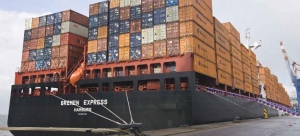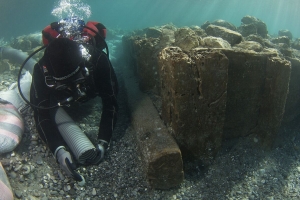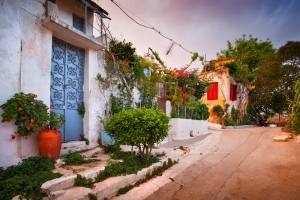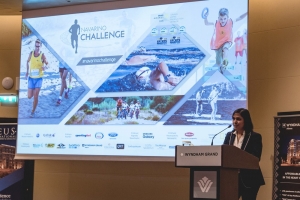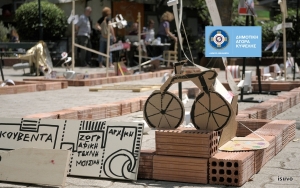The top sports tourism fest is fast approaching on October 13-15.
The official presentation of “Navarino Challenge” took place on September 27th – World Tourism Day, announcing the event’s highlights. The 5th annual sports tourism fest will take place on October 13- 15 2017, in Messinia and Costa Navarino.
The press conference was hosted at the Wyndham Grand Athens hotel, and was attended by distinguished guests, including among others, the Greek American ultramarathon runner Dean Karnazes, who participates at the event as its ambassador in Greece and abroad for the 5th consecutive time, the Olympic and World Champion in 400m. hurdles, Periklis Iakovakis and the physical education instructor specialized in pilates, Mandy Persaki. One of the day’s highlights was the exclusive presentation of the “Navarino Challenge 2016” video.
On behalf of Costa Navarino, Marina Papatsoni, Marketing & Business Development Director at TEMES, mentioned: “When we conceived the idea of Navarino Challenge in 2011, we didn’t think that we have achieved as much as we have today. It is one of those cases where we succeeded in doing much more than we would have dreamed of! Navarino Challenge is a great celebration, where athletes and organizers come together, have a good time, learn to love nature, sports, good nutrition, and eventually learn how to live better. We look forward to seeing you all in Costa Navarino to share once again, unique moments and experiences”.
Akis Tsolis, Chief Executive Officer of Active Media Group, said: “As the United Nations General Assembly affirmed when announcing 2017 as the International Year of Sustainable Tourism for Development, tourism can contribute to all the three dimensions of sustainable development – economic, social and environmental – and each of the 17 Sustainable Development Goals. All these goals have brought Navarino Challenge at the top of Sports Tourism Events. With principles based on the Olympic ideal and "fair play", from the first year in 2013 the event generated innovation and had a key role among sports tourism events. Once you participate in Navarino Challenge you will understand the essence of the famous Greek hospitality. The athletes that participate all comment how friendly and inviting the Messinians are. We owe huge gratitude to the people of the region and Costa Navarino for all they have done to make Navarino Challenge a success. We want the next generation of Greeks to feel and act differently about exercise, the environment and personal responsibility. We want to be part of creating a better Greece”.
On the official airline partner side, Theresa Cissell, Country Manager for Greece & Cyprus, of Qatar Airways, mentioned: “Qatar Airways, the national carrier of the State of Qatar, is celebrating 20 years of Going Places Together with travelers across its more than 150 business and leisure destinations. Qatar Airways is named “Airline of the Year” for 2017. Qatar Airways proudly supports a range of exciting international and local initiatives dedicated to enriching the global community that it serves. Qatar Airways, the official FIFA partner, is the official sponsor of many top-level sporting events, including Navarino Challenge, reflecting the values of sports as a key element in bringing people together. Navarino Challenge is a unique event that aims to raise awareness about the benefits of healthy living and exercise as well as the issue of childhood obesity, and through its numerous activities promotes the spirit of sportsmanship and fair play. Qatar Airways sponsorship strategy is aligned with the Qatar Vision 2030 and is based on three core pillars of Sports, Culture and Education, and for 3 consecutive years we are proud to fulfil our vision through Navarino Challenge and its ambassadors”.
On behalf of Sportingbet, Giannis Kapodistrias, stated: “In the last few years we watched Navarino Challenge as spectators with great admiration. It is such a pleasure for us that this year we sponsor this event. Of course, we will actively participate with our team in most sports. We are also looking forward to offering a warm welcome and a happy start to the full-of-surprises party that we organize at Costa Navarino for all participants on Friday night. We wish every success to Navarino Challenge 2017”.
On the side of the natural mineral water sponsor “Vikos”, Natassa Krentz, Marketing & Communications Manager of VIKOS SA, said: “VIKOS SA has lived for many years constantly next to sports, supporting the top sporting events organized in all lengths and widths of the country. We embrace and support events that include the values and athletic ideal that characterizes our company and governs our strategy. We promote in a multidimensional way the athletic activity and the spirit of good sportsmanship, in high level events with great appeal and infiltration to the general public, in all ages, ordinary citizens and athletes, supporting local sports clubs and a number of sporting events and activities throughout Greece. In this spirit the active support of Vikos is included in another Navarino Challenge for the 5th consecutive year, the top event of sports tourism in Greece, taking place in the enchanting and rich in history landscape of Messinia, at Costa Navarino. The Natural Mineral Water “Vikos”, the first bottled water in Greece, will provide the necessary hydration and stimulation to athletes of all ages and activities thanks to its rich mineral composition. Natural Mineral Water “Vikos” is bottled directly in the homonymous source, in the pristine and protected Zagorohoria, and has been recognized as Natural Mineral Water suitable for low-sodium diet, low salt and high in calcium, contributing to the good functioning of the organism. “Vikos” natural mineral refreshments will cool young and older people with their 8 unique flavors, while they are the only ones with Natural Mineral Water and natural fruit juices”.
Petri Logara, Ford Motor Hellas Operations Manager, also commented: “Ford Motor Hellas has the pleasure of participating for the fourth consecutive year, as a transportation sponsor, in one of the most important sporting and tourism events of our country, which promotes “fair play”, Navarino Challenge! In one of the most beautiful places in Greece, in the picturesque Messinia, young and older people will have the opportunity to experience the joy and well-being of sports through many different activities as well as to relax and rest at Costa Navarino. Ambassadors in their efforts will be the Greek American ultramarathon Dean Karnazes and the Olympic medalist of Tae Kwon Do Alexandros Nikolaidis. We wish a great success to the event and fun for everyone!”
The Greek-American ultramarathon Dean Karnazes stated, among other things: “Five years ago Peter Poulos and Akis Tsolis came to me with an idea. So they asked me ‘what do you think’ and I told them it is a good idea but it is a very progressive idea. You are ahead of your time. Last month Sir Richard Branson came to me and he said I have an idea for an event. He said “I want it to be for athletes of all ages & abilities. I want to offer more than just running”. So he said “What do you think?” and I said “You are 5 years too late!”. What is happening here, I think is fantastic, and I say that having run in many such events in various places around the world, I am proud to be an ambassador to this particular event”.
The new schedule of the multi-awarded event includes 17 activities, and registrations for “Navarino Challenge” in running, swimming and SUP continue for a few more days. For your registration please complete the form
HERE!
The detailed program with all activities is available
HERE!Kinder + SPORT, Ferrero’s Corporate Social Responsibility Program, will be supporting this year's “Navarino Challenge” as part of the effort to boost physical activity in young children. In particular, as an official promoter of the Navarino Challenge, it embraces the Kids’ Athletics by Kinder + SPORT activity, bringing the children into contact with the track and field events, with Ambassador the Olympic and World Champion at 400m. hurdles, Periklis Iakovakis. In addition, the range of activities for children includes Tae Kwon Dowhereby through the “voice” of the Olympic medalist Alexandros Nikolaidis, Kinder + SPORT will encourage children to have fun through sports and to engage in an active lifestyle, finding and practicing the sport they love.
Sportingbet, one of the leading online gaming companies in the world, is participating this year as an official sponsor, while Samsung as an official technology partner.
Athletes taking part will have the opportunity to quench their thirst with the natural mineral water “Vikos” that contributes to the good body’s good function during sports. At the same time for the fourth consecutive year, athletes and organizers will move with the safety and efficient engines of Ford Motor Hellas, the official sponsor of Navarino Challenge.
National Geographic part of FOX Networks Group Greece is a strategic partner of the event for one more year, while with its numerous team it will have a dynamic presence in all sports activities!
Melissa pasta will be the official nutrition supporter for the first time. Melissa will be in Messinia and Costa Navarino on the occasion of Navarino Challenge with its new food truck, “Melissa On the road” and favorite food blogger Mamatsita will treat all participants in the Melissa Pasta Party, where she will create special autumn recipes with Melissa whole wheat penne, farfalle and fusilli. Because in sports we are also fans of pasta!
Official supporters include BIC®, BIC® Sport, GoPro, Wyndham Grand Athens, Poseidonia, Surf Salad and the sports nutrition company QNT
Navarino Challenge” will be held under the Auspices of the Greek National Tourism Organization with the co-organization of Costa Navarino, The Westin Resort Costa Navarino and Active Media Group and the support of the Municipalities of Pylos-Nestor and Trifilia. The sport of boccia will be held under the auspices of the Hellenic Paralympic Committee.
Official Airline Partner: Qatar Airways
Official Technology Partner: Samsung
Official Sponsors: Sportingbet, Natural Mineral Water “Vikos”, Ford Motor Hellas
Official Nutrition Supporter: Melissa
Official Supporters: Kinder + SPORT, BIC®, BIC® Sport, GoPro, Wyndham Grand Athens, Poseidonia, Surf Salad, QNT
Strategic Partner: National Geographic
Assisted by: Inbi, Navarino Outdoors, Swim Academy, Navarino Racquet Academy, Health Runners Club of Messinia, Pylos Association of Enterprises for Tourism Development, Maritime Athletic Pylos Association “Nestor”, Explore Messinia, Navarino Golf Academy, Hellenic Athletics Federation (SEGAS), IAAF Kids Athletics, Vizantinos target sport club, Target Security


